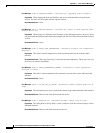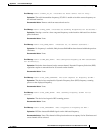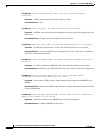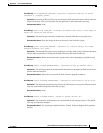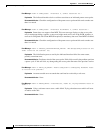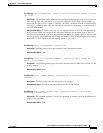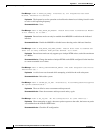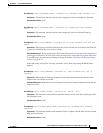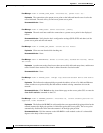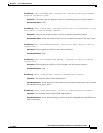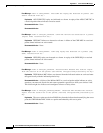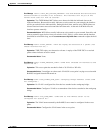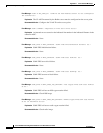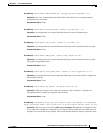
C-14
Cisco IOS Software Configuration Guide for Cisco Aironet Access Points
OL-11350-01
Appendix C Error and Event Messages
802.11 Subsystem Messages
Error Message DOT11-4-UPLINK_LINK_DOWN: “Interface %s, parent lost: %s.”
Explanation
The connection to the parent access point on the indicated interface was lost for the
reason indicated. The unit will try to find a new parent access point.
Recommended Action None.
Error Message DOT11-4-CANT_ASSOC: Cannot associate: [chars]
Explanation
The unit could not establish a connection to a parent access point for the displayed
reason.
Recommended Action Verify that the basic configuration settings (SSID, WEP, and others) of the
parent access point and this unit match.
Error Message DOT11-4-CLIENT_NOT_FOUND: “Client was not found.”
Explanation
Client was not found while checking mic.
Recommended Action None.
Error Message DOT11-4-MAXRETRIES: Packet to client [mac] reached max retries, remove
the client
Explanation
A packet sent to the client has not been successfully delivered many times, and the max
retries limit has been reached. The client is deleted from the association table.
Recommended Action None.
Error Message DOT11-4-BRIDGE_LOOP: “Bridge loop detected between WGB %e and device
%e.”
Explanation
The indicated workgroup bridge reported the address of one of its indicated Ethernet
clients and the access point already had that address marked as being somewhere else on the
network.
Recommended Action Click Refresh on the Associations page on the access point GUI, or enter the
clear dot11 statistics command on the CLI.
Error Message DOT11-4-ANTENNA_INVALID: “Interface %s, current antenna position not
supported, radio disabled.”
Explanation
The Indicated AIR-RM21A radio module does not support the high-gain position for the
external antenna (the high-gain position is folded flat against the access point). The access point
automatically disables the radio when the antenna is in the high-gain position.
Recommended Action Fold the antenna on the AIR-RM21A radio module so that it is oriented 90
degrees to the body of the access point.



